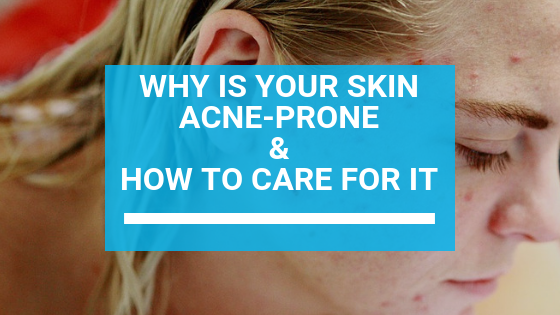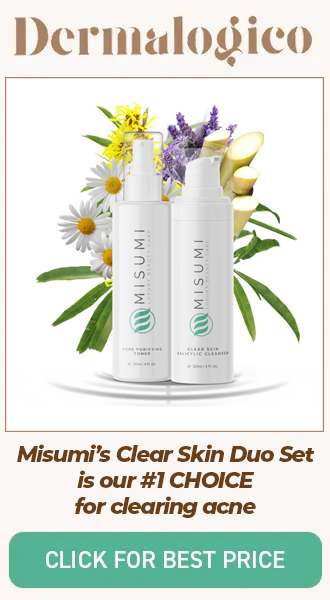Although acne is the most common skin disorder which affects between 70 and 95% of adolescents, very little research has been done on the subject. The medicine for acne, both topical and oral, which is deemed as groundbreaking, has only been on the market for decades. It seems like we have many questions unanswered when it comes down to this topic: Why does acne occur? What can be done about it? How big of a role do genes play in the development of acne?
The good news is that we’ve made some progress and although we can’t pinpoint every single reason behind your breakouts, we can narrow down the possible triggers and create an effective treatment plan that will tackle those nasty zits from all sides.
In this article, we’ll explore the reasons why you have acne-prone skin and which is the best way to take care of it. So, if you suffer from sensitive and acne-prone skin and you never get a break from nagging face breakouts, then this is the article for you.

What is Acne-Prone Skin?
Firstly, we must establish exactly what constitutes acne-prone skin. Simply put, acne-prone skin is skin that can break out more easily with comedowns and zits than other skin types. One of the reasons why this occurs is because people with acne-prone skin tend to have increased overall sebum production. Increased sebum means more congestion in your pores. That, combined with acne-causing bacteria (acne vulgaris) and dead skin cells leads to acne.
Typically, teenagers and adolescents are the target group of this annoying skin condition. However, due to certain hormonal changes and fluctuations, older adults can also experience breakouts, years after they’ve come out of puberty.
Acne isn’t the same for everyone. Some people never get it while others struggle with acne for years. The type of acne that people experience also differs from person to person. Some women get occasional hormonal breakouts around their period, while others break out every day of the month with comedones. The type of acne you have depends on your specific condition. Generally speaking, there are several types of acne:
- whiteheads
- blackheads
- pustules
- nodules
- cysts
What Causes Acne?

Now that you know what the symptoms of acne-prone skin are, you can easily conclude whether or not your particular skin type fits the description.
If so, it’s important to get yourself familiar with all the different factors that cause breakouts in the first place. And while you can’t influence all of them, you can certainly make some positive changes in your day-to-day routine.
The biggest causes of acne are excess oil production, acne-causing bacteria (acne vulgaris), clogged pores and excess hormones (androgens).
These factors directly contribute to the appearance of acne. But there are some underlying factors which also have a role in acne formation. Here are some hidden acne triggers:
Genetics

We can’t change genetics, no matter how much we want to. Genetics determine the skin type we’re dealt with, how much sebum our skin produces and whether or not it’s going to be more susceptible to breakouts. If you’re younger, one way to determine if you’re going to have acne is by looking at the medical history of your parents. If both of them had acne, there is a higher chance that you too will develop acne.
Hormones
As we’ve already mentioned, androgens are the hormones to blame for breakouts. These stimulate the sebaceous glands and cause more oil to be produced in return. One of the main reasons why teenagers suffer from acne is due to the increase of hormones during puberty. Hormonal fluctuations are the most common reason why people over the age of twenty develop acne, too. Once we get our hormones under control, the sebum production will go down.
Medication
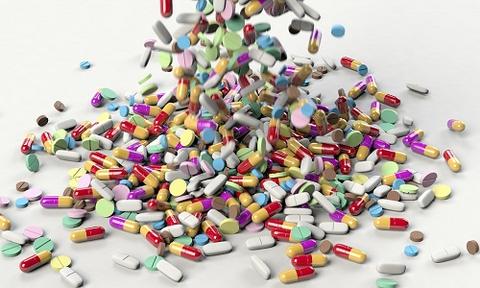
There is enough evidence to conclude that certain medication such as lithium, steroids, and testosterone can worsen acne. Birth control pills are a whole other story – some women see an instant improvement in terms of their acne as soon as they go on birth control. For others, it makes their acne worse. It all comes down to the individual. However, it’s safe to conclude that birth control pills aren’t a permanent solution for acne- they just mask the reason behind your breakouts. If you don’t fix the root cause of your acne, it will continue to flare up as soon as you stop the medication.
Stress
We’ve all heard the thesis that stress makes acne worse. Is there any truth behind this claim? Apparently so. Stress can trigger acne and make the existing acne worse. When you’re stressed, the stress hormone called corticotrophin-releasing hormone is released which increases sebum production.
When you’re stressed, your skin is also more irritable and itchy, which makes some people more prone to scratching it with dirty hands. If you want to decrease your stress levels, try working out or doing yoga on a regular basis.
Diet

This is an ongoing debate, but there’s more and more evidence to conclude that there is a relation between the food you eat and your breakouts. For instance, dairy seems to cause acne according to some studies. Moreover, food with a high glycemic index is also known to trigger breakouts. In order to avoid this, decrease the amount of dairy you consume and increase the number of vegetables and fruit in your diet.
Why Are Some People more Prone to Getting Acne?
The question we’ve all asked ourselves at one point in our lives: why are some people more susceptible to getting acne than others? There are so many people out there who don’t pay attention to their diet, exercise or stress levels yet they still walk around acne-free. Why is this so?
Apparently, there is no final answer as to why this happens, although dermatologists agree that genetics play a large part in it. Genetic predispositions make the skin more prone to getting acne, the sebaceous glands more prone to getting inflamed and triggered and the hormones more likely to be affected.
Some dermatologists claim that the receptors in your skin have something to do with it. These receptors are called TLRs, and it’s believed that they are more sensitive in people who naturally have acne-prone skin.
Can Acne Affect more than your Appearance?

Needless to say, acne doesn’t just affect your face, but it also changes your perception of yourself and your self-confidence. These two factors influence the quality of your life. Whichever type of acne you suffer from, know that you’re not alone in your struggle. It’s crucial to stay positive, patient and persistent while you’re searching for the cure that’s right for you. And you never know what could happen, the next product you try or the next dermatologist you visit might help you end this struggle once and for all. The most important thing is not to give up.
How to Care for Acne-Prone Skin
Now that you know what acne-prone skin really is and what triggers it, let’s get into how you should care for it. Acne-prone skin is certainly not easy to deal with, but with these few adjustments and tips you can make a change in your skin to the extent that you can.
Have a Proper Skincare Routine
Taking care of your skin and having a detailed anti-acne regime might sound exhausting and unnecessary to you. And you might find the fact that you have to spend time on it every morning and night frustrating because some people get away with only washing their face with water. But a proper skincare routine will ensure that your skin is soft and healthy in the long run, so try to think of it as an investment.
So, what does a skincare routine for people who have blemish-prone skin entail? Firstly, you might have a preconceived notion that any regime designed for acne-prone skin should be complicated or should contain a myriad of skincare products. This is not true – you likely need a couple of staples, unless you’ve been prescribed something special by your dermatologist.
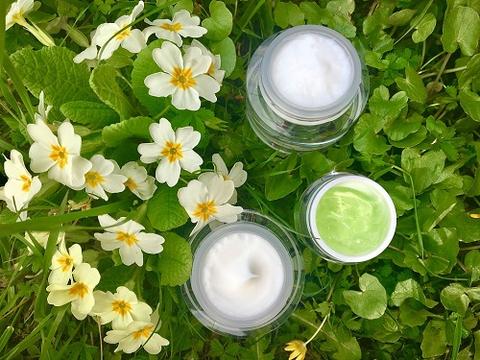
Choose a gentle cleanser that’s suitable for your skin type. You can find out what your skin type is here. In general, it’s safe to say that those who have dry skin should stay away from gels since gels tend to dry out your skin even more, making them perfect for people who already have oily or combination skin.
Dry skin types should gravitate toward milky cleansers – they will remove any dirt that’s sitting on top of your skin as well as makeup. In the meantime, they will also provide hydration and won’t be too abrasive for your skin. If you have active acne breakouts, try finding a cleanser that contains ingredients such as salicylic acid or benzoyl peroxide. These will help fight the blemishes, which will minimize the chances of hyperpigmentation in the future. Make sure you clean your face gently, with soft motions. If you go too hard on the face, you risk peeling off your acne breakouts, which might cause scarring.
Exfoliation plays a large role in routines for acne-prone skin. Try to exfoliate no more than two times a week, otherwise, you risk damage to your skin and drying out your skin. Regular exfoliation will remove any accumulated dead skin cells which clog up your pores and cause acne.
Include an astringent if you want an easy way to control oil production. Toners will help to remove any excess oil that might be clogging up your pores as well as tightening them. You can use a conventional toner that’s appropriate for your skin type, and there’s always the option of going for one with more abrasive ingredients like glycolic acid, which will help with breakouts as well. You don’t have to use one that’s chemically-based. Witch hazel toner can work wonders on the skin, and it’s completely natural.

Follow up your cleansing routine with a nice and hydrating moisturizer, regardless of your skin type. Make sure that it’s labeled as non-comedogenic and appropriate for people with sensitive skin. Its texture should be light because heavy moisturizers don’t work well for blemish-prone skin, particularly if you’re planning to layer products on top of each other.
Consider adding retinol in your skincare routine. Retinols such as Retin A are vitamin A derivatives which not only help with breakouts, but they also have the ability to provide you with regular exfoliation. On top of that, they help with signs of aging like fine lines and wrinkles. If you do decide to include a retinol cream, it’s imperative that you apply sunscreen on a regular basis. Retinols make your skin more sensitive to the sun, and you have a higher chance of suffering from sunburn or sun damage while you’re using them.
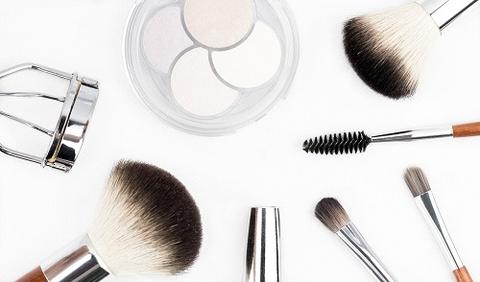
For all you makeup lovers out there, pay attention to the products you’re purchasing. Always opt for non-comedogenic and oil-free makeup, especially if you use makeup on a daily basis. If you wear heavy makeup all day long, your pores might get clogged, which will cause you to break out. Always remove your makeup as soon as you get home and get in the habit of always washing it off before going to bed. Sleeping with your makeup on is never a good idea if you have acne-prone skin.
Don’t Pick at your Skin
This is a hard habit to ditch if you’re used to picking at your pimples, but it’s important that you do your best not to touch your skin unless it’s necessary. If you constantly pick at your skin, you’re risking infection and hyperpigmentation. Poorly popped pimples have a higher chance of leaving behind a mark, and you definitely want to avoid the hassle of dealing with hyperpigmentation. It’s incredibly difficult to treat acne scars, and for most people, it usually takes a long time to brighten them. So, next time you get the urge to pop a comedone, just remember how difficult it will be to treat the scarring that will occur afterward.
Try out some Acne Treatments
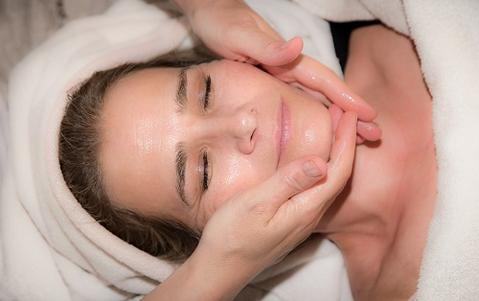
Acne treatments are a very effective way of dealing with recurring acne. Treatments such as chemical peels or microdermabrasion might help you if you have any scarring or acne, but they can oftentimes be too expensive and take a long time to recover from. What you can do instead is include an OTC product that contains acne-fighting ingredients such as AHAs, sulfur or benzoyl peroxide.
There are many effective spot treatments that can be used directly on the pimple on a regular basis. Simply apply the chosen product on your pimple and leave it to work overnight. Once you get up in the morning, wash off any residue with warm water and a cleanser. When it comes to spot treatments, you have the option of going for the conventional route and choosing a chemically-based one, or if you prefer natural products, you can use something like tea tree oil which works just as well.
Pamper your Skin with a Face Mask
Every now and then, try to include a face mask as a part of your pamper night. Face masks are not only fun to apply and experiment with, but they can also be of great help, provided that they’re appropriate for your particular skin type. In order to ensure that you’ve selected a proper mask, scan the ingredient list quickly. Look for ingredients such as tea tree oil, niacinamide, sulfur, and AHAs or BHAs. There are several types of face masks you can try out, ranging from sheet masks to clay masks. You also have the option of making one at home using ingredients you already own like oatmeal and baking soda.
If all else Fails, Visit a Dermatologist

Dealing with acne prone skin is already difficult to begin with, but if you don’t have anyone to guide you along the process it can be very frustrating and discouraging. If you’ve struggled with your skin for a long time and nothing has worked for you, consider visiting a dermatologist. They will help the process by giving you options for a proper skincare regimen, suggesting some harsher treatments that will speed up the process and provide you with emotional support during your journey.
Final Thoughts
Hopefully, those who have acne-prone skin have found this article helpful. Remember, although the products you use have a great impact on your skin, your lifestyle choices also have a great role in clearing up your skin. Make sure you drink enough water, get plenty of exercise, find ways of coping with stress and pay attention to your diet. Include many fresh fruits and vegetables that will provide you with the antioxidants needed to fight inflammation.
Dealing with acne-prone skin is not a walk in the park, but it can certainly be easier than you think.
This information is meant to supplement, not replace advice from your doctor or healthcare provider and is not meant to cover all possible uses, precautions, interactions or adverse effects. This information may not fit your specific health circumstances, and its goal is to offer a general view of the subject. In case you are suffering from a severe case of acne, you should consult with a dermatologist or a certified medical professional.

